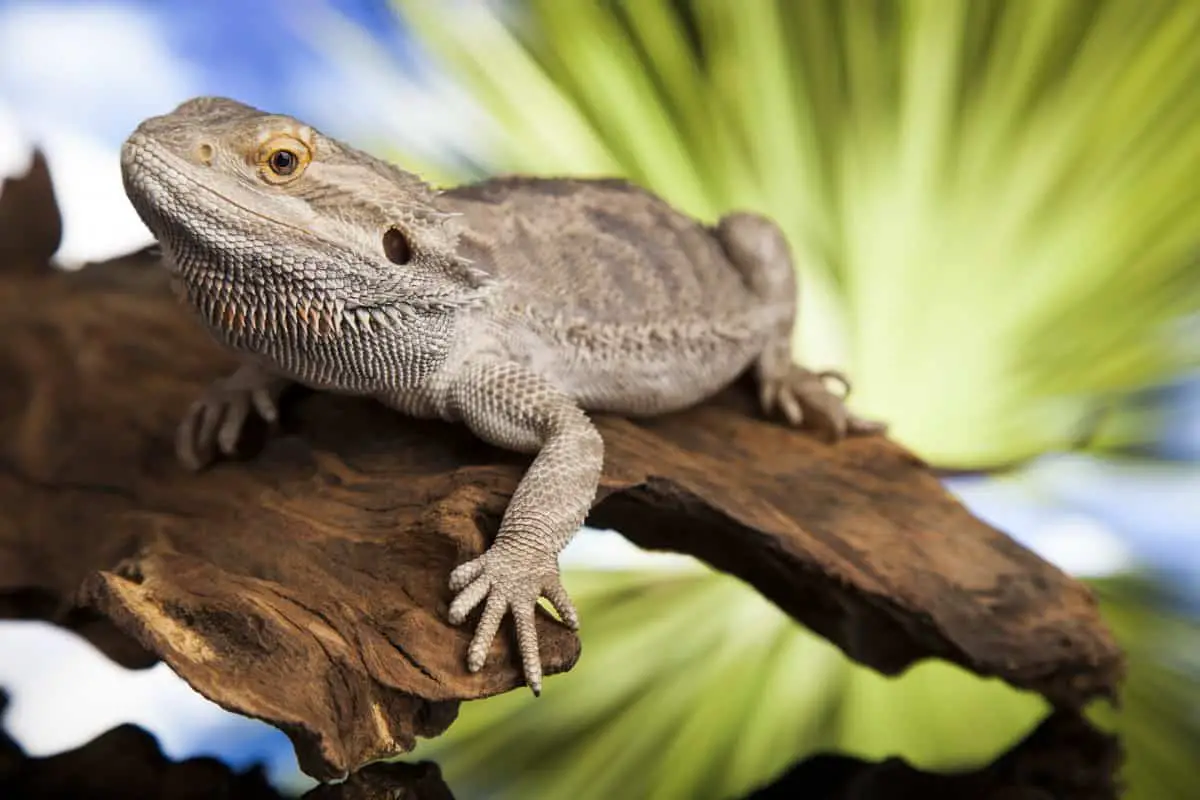Affiliate Disclosure: This post may contain affiliate links. If you make a purchase after clicking on these links I will be compensated at no extra cost to you. However, I never recommend anything I don’t love or wouldn’t use myself!
You may notice that your bearded dragon’s behavior changes drastically depending on what they smell around them. This is because bearded dragons have adapted their senses in many different ways for protection. To survive in the wild, your beardie’s instincts kick in.
Are bearded dragons sensitive to smells? Yes, bearded dragons are sensitive to smells. They can get anxious or have different changes in behavior when they are around strong, unusual smells such as a candle. They have even been known to bite the hands of owner’s if they still smell like food or rodents.
Bearded dragons actually smell with their tongues, meaning they essentially must lick things to smell them. This may account for why they are startled by an unfamiliar or unpleasant smell – it’s a strong sensation for them. You probably want to protect your pet lizard from this kind of unpleasant surprise. Here’s how.
Why Bearded Dragons Are Sensitive to Smell
Bearded dragons don’t have the best sense of “smell” as we know it. Because they can’t just sniff something as we do, their encounters with odd smells can bring pretty strong reactions.
A slight scent that is far away won’t really reach a bearded dragon. If something has a very strong smell to a beardie, that means that thing is very, very close. And if it’s a scent that isn’t comfortable or pleasant, your dragon may get anxious or frightened.
For instance, some very gentle beardies have been known to attempt to bite their owner’s hand, if the hand has come into contact with something the beardie doesn’t recognize. This goes to show you how a strong or unfriendly scent can cause this pet to react in a way it normally wouldn’t.
Tasting and smelling will always go hand in hand with the bearded dragon because of where its smelling sense lies. If you had to taste everything you came into close contact with, you may start being a harsher judge of those smells as well!
How Do Bearded Dragons Smell?
Bearded dragons like most reptiles smell through a process known as chemoreception. This process utilizes something called a Jacobsen’s organ. This organ is crucial for reptiles, amphibians, and mammals and their ability to smell.
Chemoreception is defined by Brittanica.com as “the process by which organisms respond to chemical stimuli in their environments that depends primarily on the senses of taste and smell.”
The Jacobsen’s organ consists of a cluster of sensory cells within the main nasal chamber that will detect odor particles with heavy moisture. Airborne odors are instead detected by olfactory sensory cells within the nasal chamber.
So, right away, we know that bearded dragons are genetically programmed to react to the world around them, based on what they smell and taste.
How the Bearded Dragon Tastes Aromas
For the bearded dragon, Jacobsens’ organ is connected to the upper mouth while most other animals it is connected through the nasal cavity. Hence this is the reason why most animals smell through their nose, while the bearded dragon and other lizards smell right through their mouth.
The lizard uses its tongue to bring odor particles into the mouth which is then smelled. The smell is initiated by chemical compounds binding to the receptor molecules, which then send sensory messages to the brain.
If the message is “this is a terrible smell,” your bearded dragon is probably going to show you that in his behavior.
This organ is also very useful in communicating chemical messages like readiness for sexual activity. Some evidence even suggests that the organ influences the detection of chemical signals that relate to territoriality and aggression.
All I all, the bearded dragon relies heavily on the senses of taste and smell to explore and judge the safety of the world around it.
Do Bearded Dragons Have a Good Sense of Smell?
So while bearded dragons are sensitive in that they react strongly to smells, they actually have a rather poor sense of smell. Having to smell through their mouths means a couple of things.
- They can’t smell things until they’re up close, and they need to stick out their tongue to bring the affected air into their mouth. This smelling process is much slower than most other animals.
- They can’t smell in a broad range because of this limitation. To smell, they need to stick their tongue out at very specific things, and they are unable to smell a lot of things at once, like humans and other creatures.
Tip: Some scents you think are nice, like a strongly scented candle or air freshener might be disturbing and disorienting to a bearded dragon. It’s unfamiliar and not something your pet can “test out” with its tongue for safety, so it can make the beardie anxious.
Other Smells That Bug Your Dragon
Since dragons are sensitive to smells, it would be best to keep their cage clean. There are several reasons why your bearded dragon’s cage might smell:
It Could Be the Dragon Itself
- Some bearded dragons can develop fungal infections, which will cause them to be stinky.
- Maybe you are using paper towels or loose substrates in the habitat that trap odors such as urine and poop
- If there is sand in the cage, it can really trap the scents of your beardie’s waste. As your dragon walks through the sand, it picks up those odors.
Non-loose substrates such as linoleum tile or reptile carpet will solve this issue. They are much easier to clean, and they are safer for your bearded dragon. A solid substrate means less respiratory issues, eye infections, and impaction.
What if the Odor Is Coming from a Fungus?
If you are worried that your dragon may have a fungal infection, here are some steps you can take:
- Give the beardie a long, warm bath – about 20 minutes will do.
- Use a gentle baby soap and rinse well
- Brush them gently with a soft toothbrush
- Dry well with a soft towel
The dragon should not smell for a while after coming out of the bath. If it does, fungus or another health issue should be determined by a veterinarian.
Note
about skin:
Take your beardie into the vet if you find that
his skin is smelly, or if you notice anything that looks “off”
about the skin. Some bearded dragons can contract mites and ticks.
You might notice tiny little dots moving around the scales, under
them or between skin folds. Check carefully around your beardie’s
head.
Taking Care of Habitat Odors
If the smell is not coming from the bearded dragon when it’s outside of the habitat, maybe it’s something in the habitat itself that is causing the unpleasant odor. Give a good look inside the beardie’s cage. Here’s a look at some common odor-causers and how to take care of them.
Rotting Food
- You must make sure you remove all feeders and uneaten food from the tank every 24 hours.
- To remove all bacteria is it recommended that you thoroughly clean your dragon’s tank every few weeks with diluted bleach solution.
- Use a warm soapy mix of water after the bleach, so your bearded dragon doesn’t ingest any trace chemicals.
Parasitic poop
- If the poop seems particularly smelly, see the vet.
- You’ll probably have to bring in a stool sample to help determine if parasites are present.
- This kind of inspection usually costs about $15-$30 depending on where you are.
Paper towels or loose substrate
- As mentioned above, switch to a solid substrate that doesn’t retain odors and it much easier to keep clean and sanitary.
Important Notes About Cleaning the Habitat
Most cleaning steps for any pet cage are pretty straightforward, but here are some specific tips to help you get started.
- Baking soda is highly toxic to bearded dragons. If ingested, it will pose serious respiratory problems and maybe even death. Skip it at all costs!
- Instead, use a 10% bleach water mix and then use warm water as a finishing rinse to remove all traces of bleach.
- If there is a fungus or bacterial issue, throw away all accessories in the tank, as well as the substrate and start from scratch.
- First thing’s first. The primary goal is to first determine where the smell is coming from, then determine your next steps.
Fresh-Smelling Habitat Equals Happy Beardie
There are products available online or at any pet shop that should help eliminate odors within your bearded dragon’s cage. Since we know they are so sensitive to smells, help them out and keep their habitat clean and fresh!
An odor-eliminate substrate, such as ReptFresh can help do the job. Most products of this sort work this way:
- Mix it in with your regular substrate and fill the dragon’s cage.
- Use the recommended
amount on the bag for mixing into the
substrate.
- For instance, 1 bag is recommended for a 40-gallon tank
- The substrate should be changed every 6-12 months
- Always use a scoop as well to get the poop out easier

